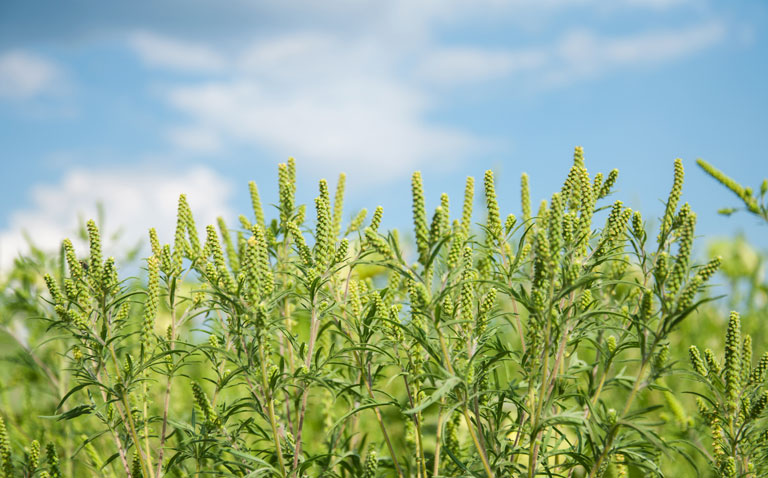A new study published in Nature Communications suggests that a species of beetle could help control an invasive and highly allergenic weed at the root of many people’s allergies.
Allergies caused by the common ragweed, Ambrosia artemisiifolia, impact millions, and in Europe alone, around 13.5 million people suffer with symptoms, resulting in 7.4 billion Euros worth of health costs per year, according to the research. The study suggests the leaf beetle, Ophraella communa, could reduce the number of people affected by the pollen and the associated economic impacts, since the beetle – itself a recent arrival in Europe – loves to munch on the invasive plant.
Using data from the European Pollen Monitoring Programme, a team of researchers including co-first authors Sandro Steinbach of UConn’s Agricultural and Resource Economics Department and Urs Schaffner of the Centre for Agriculture and Bioscience International, mapped seasonal total ragweed pollen in Europe from 2004-2012. They then determined ragweed sensitization rates in the European population to estimate the number of allergy sufferers.
They estimate that 13.5 million people were affected by seasonal ragweed pollen allergies, with economic costs of approximately 7.4 billion Euros per year, including factors such as medical costs and work absences. These numbers are prior to the unintended arrival of O. communa in Europe in 2013.
By modelling the number of generations of the beetle across its suitable habitat range in Europe, the authors project that biological control of common ragweed could reduce the number of people suffering from the ragweed allergy to approximately 11.2 million, and bring the health costs down to 6.4 billion Euros per year.
“Our conservative estimates indicate that biological control of A. artemisiifolia by O. communa will reduce the number of patients by approximately 2.3 million and the health costs by Euro 1.1 billion per year,” says Steinback. “Future costs of this management approach will be basically zero since the beetle has established permanently and is propagating by itself.”
Though this research is specific for Europe, this method of biological control is already happening in China where the beetle is reared and distributed for the control of ragweed. Fortunately, the authors note that previous studies suggest the beetle would have no negative impacts on native or ornamental plants in Europe, so this form of biological control may have no unintended consequences on the local landscape.
This research also underscores the need for more work to be done on the human health impact of invasive alien species, since the benefits of management strategies are likely greatly undervalued, as shown by the authors’ estimated public health costs being higher than previously reported.
Schaffner says another aspect the team is currently looking into is how climate change will affect the distribution of the weed and the beetle and whether the beetle’s impact on pollen production by A. artemisiifolia will increase or decrease in the future.










